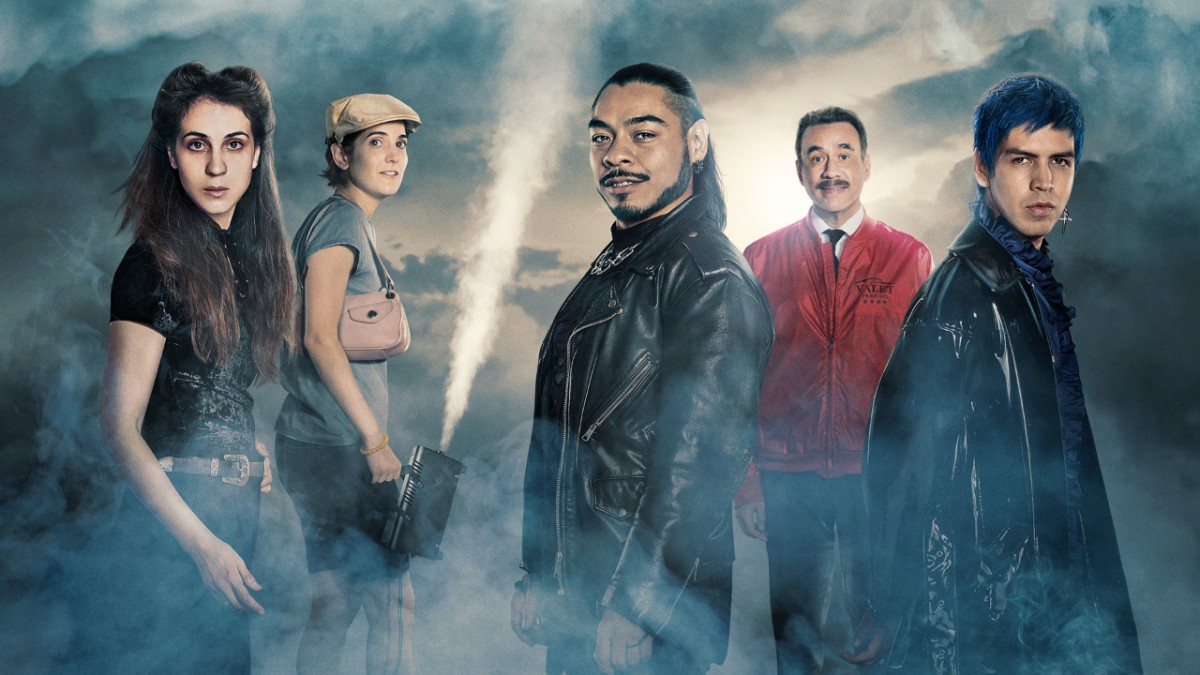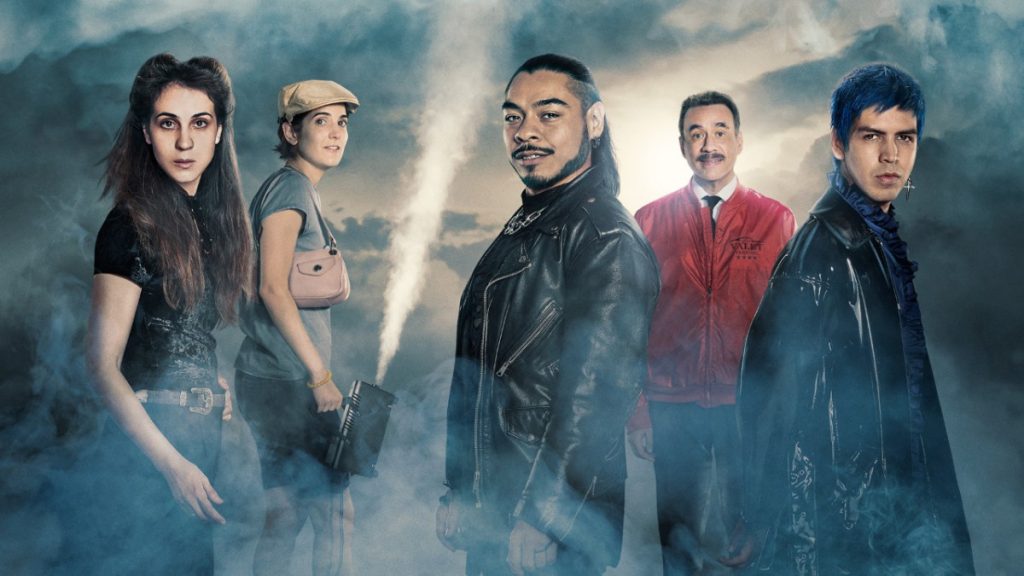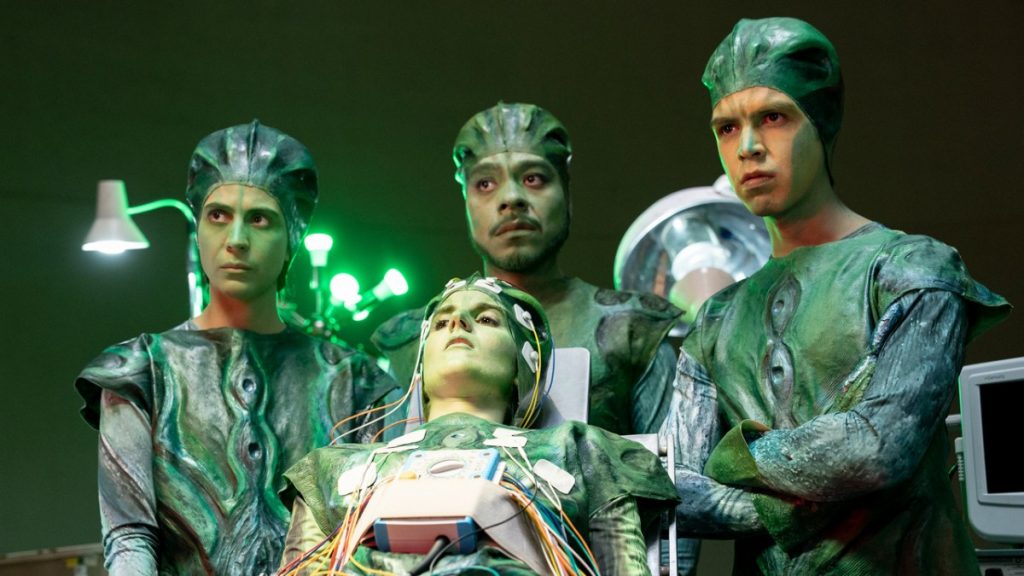Los Espookys is immediately and inimitably cool, chilling. A ghastly procession, pale youth and thick fog, a black parade. Just as the dark princess emerges, everything is rendered instantly, ironically innocuous: the eerie scene is actually a Quinceañera. Not just any Quince. Monster molds sickly emit refreshments. Horror d’oeuvres are served in gleeful, gory glory.
Uncle Tico (Fred Armisen) is impressed by the impeccable craftsmanship. He’s equally delighted to learn that the party is the work of his nephew Renaldo and friends, a group of nascent but talented horror technicians. Uncle Tico, who has a penchant, passion and profession to park cars, encourages his nephew to pursue his own “parking”, to follow his nightmarish dreams. Luckily, there are a number of people who need a good scare.
Strange Times
Thus begins one of television’s best new comedies. Distinct, ephemeral, upbeat and understated. Spectacle that’s supernaturally suburban and magically tangible. Fake outs and letdowns, classic sitcom misunderstandings and misrepresentations. Running jokes in dashing directions. Serene, surreal imagery and ridiculous visual gags. Moody, brooding, syrupy, unctuous soundtrack. Shoddy costumes employed against unbelievable gullibility. Hollywood-budget-level production values, too elaborate and expensive for characters’ means or the parameters of the premise, quickly deflated by a sardonic barb. Los Espookys is wickedly funny, clever and demented. It plays and prances on expectations and convention. The gore and lore is tactile and visceral, sometimes downright disgusting, celebrating gross, loving practicality.
It makes sense that Los Espookys is set in fabricated amalgamations: a fictional, unnamed Central America country and Los Angeles. The accents, languages and dialects are all over the place, on purpose. Authorship is ambiguous, ambitious, collaborative. Wildly erratic, exquisite twists build and deflate, subvert and invert. Plotting and comedy-crafting, hard jokes, mystifying non sequiturs, unexpected references and sly reveals, often lead to smart and satisfying surprises.
Anticipate, try to get ahead of, or think you’ve put your thumb on Los Espookys, if you dare. The show is a deliberate anti puzzle box. Most narratives with ominous, overarching machinations aim to flirt with an audience’s curiosity. These shows—no shade—artificially obscures information, inflating investment and engagement, to unscrupulous, meandering ends. Los Espookys foreboding set-ups reach hollow, underwhelming or illogical ends. There often won’t be a payoff. If a plot does pay off, the money is in irregular bills. The show invites your foolishness and rewards with foolishness. It’s wonderful. Laughs echo in the chasm between anticipation and abrupt, listless conclusions. It’s all a smokescreen for something grand and exciting: the banal.
The show implements touchstones, homages and references, that are precise, innate, intangible. It’s a bilingual, multidimensional, genre-bending dreamscape that hums at a brilliant, deliberate, ethereal frequency. As camp as a sleepaway slasher flick. The inherent kitsch is effective, affecting, with alluring, confident, B-movie, analog, soap opera swagger. Jokes are lived, loved, authentic, but, thankfully, not universal. Everything is refreshingly specific. Jokes often live above and below an unwitting grasp, glancing contact with context clues, if not in hand. Inferences can lead to appreciation, but for those who truly understand, and feel represented, Los Espookys must be heavenly. The show is a mobile and malleable alternate state that’s out of this world. Expansive, expressive and endless, a universe. Los Espookys is ultimately a testament that nothing gets lost in translation when you make your own language.
The Real
The thing is rarely the thing. Omnidirectional outsider perspectives make every character equally intriguing. Themes, allusions (or, making reference to, then ultimately rejecting lofty literary devices) play out in each character’s hands. Our heroes’ mystical misadventures turn into internal investigations, shifting, ruminating in imagination, flashbacks, haunting voids or acquiescence. The solutions for each problem seem obvious. But it isn’t, until they experience enlightenment, until they know.
For instance, sexuality, or, more specifically, queerness, especially in regards to Andrés, played by Julio Torres, is nearly nonexistent or inconsequential. Not to downplay the casual revolution of Andrés’s gender expression, but his style and droll demeanor, is relatively regular. There isn’t dread of who Andrés is, worries about implicit danger that he may encounter. He’s not distressed by who he loves, but whom. Andrés is haunted by a tumultuous, flawed relationship, that threatens to impede his fabulous, frightening truth. Andrés doesn’t feel hopelessly tragic, or codependent, due to his orientation. Instead, he’s destined to be trapped in the trappings of security. Or is he? His absurd, arranged marriage, a conflict of aesthetics, duty, and, ultimately, respect, is fully realized. How everything unfolds, everything stated, examined and appraised, is a charming journey.
Same can be said for Renaldo’s monk-like dedication, whose only love is to scare, played wonderfully by Bernardo Velasco. And Tati is searching for her prince. Love isn’t love in Los Espookys; it’s an amusing, aching reflection of grander romanticism.
Likewise, fear, for Los Espookys, isn’t a negative, but, rather, the opposite. While evoking exorcisms, extraterrestrials, and sea monsters, normalcy—responsibilities, compromises and conservative adversaries—is the real monsters under the bed. The group’s passion and gift to unnerve and unsettle, embraces what most aim to avoid, expressing life in macabre and morbid meditations. They’re afraid to be without that horrific energy, and fight like hell for it accordingly. Everyone in Los Espookys is working, scheming and dreaming, ultimately, for one last thrill.
A charming, subtle, metatextual verve emerges with what the show is and who the actors/creators are. Veritable comedy royalty Fred Armisen is the nurturing, encouraging force, a shepherd and a coach. In life and on screen, he’s a bridge between the team’s aspirations and opportunity. Co-creators and standouts Ana Fabrega and Julio Torres are fascinating, tantalizing, vital, emergent voices. Not just vital in that “delightfully novel” way genius, idiosyncratic comedians are relegated that’s code for “other”; they’re wholly and holistically intriguing as human beings. Los Espookys is an apt, self-aware allegory, defined by a beautiful fight for legitimacy while flexing sublime supremacy.
An Achievement
The show benefits from elegant simplicity. Los Espookys revolves around friendship, creativity, collaboration and complications. It’s a workplace buddy comedy exploring unintended consequences from mixing the two.
The friendships in Los Espookys are a little easier to navigate than its financials. Paying bills outside of the scare business is either sapping, empty, or nonexistent. Making or maintaining money means facing existential ennui and danger. At its core, the show is one of the most salient satires of Millennials’ relationship to employment and a generation’s economic anxiety.
Yearning with very few prospects, with an undercurrent of mundane morass, inspires palpable desperation. Caustic resignation and disappointment reverberates in their collective disillusionment. Los Espookys are a found family that regularly indulges in amorphous mystery, searching for answers. But fulfillment is hard to find.
Tati doesn’t naively dream and strive for greater things because she sees opportunity. Her world doesn’t seem interested in offering much more than odd odd jobs. Andrés isn’t blindly subscribing to a joyless romance with his beautiful betrothed, Juan Carlos. There’s an inheritance—security, esteem, individuality, destiny, and flexibility to pursue the “ugly”—at stake. Ursula is constantly in conflict with her seemingly stable, but unfulfilling dentist assistant job. And Renaldo struggles to hold his small business, ambition, and friendships, intact.
Individually, the gang grapples with the gig economy, multi-level marketing, soul-sucking careers, precarious trust funds, eccentric antagonists and myopic clientele. Together Los Espookys make dark, decadent designs to do, see, and be what they want.



